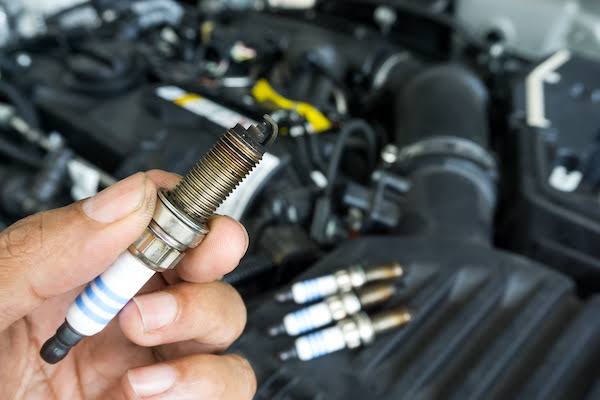Nearly 40% of American drivers admit they've continued driving after their check engine light came on, dismissing it as "not that serious."
But what if I told you that ignoring one seemingly insignificant faulty spark plug could trigger a devastating chain reaction that destroys your engine and costs you over $1,500 in repairs?
A recent automotive diagnostic study revealed that replacing ignition coils and spark plugs ranks as the third most common check engine light repair, accounting for nearly 5% of all automotive repairs nationwide. Yet most drivers have no idea how catastrophic the consequences can be when they adopt the "my car still runs fine" mentality.
The Domino Effect That Starts With One Bad Plug
Here's what your mechanic wishes you understood about spark plug failure. When one spark plug begins to fail, it doesn't operate in isolation. Your engine is a precisely orchestrated symphony of combustion events, and one misfiring cylinder creates a ripple effect that damages multiple expensive components.
Master technician David Rich from CarMD explains it this way: “When drivers ignore that initial misfire, they're essentially lighting a fuse that leads to catastrophic engine damage. The unburned fuel doesn't simply disappear.”
That unburned fuel travels directly to your catalytic converter. This emissions control device operates at temperatures exceeding 1,200 degrees Fahrenheit. When raw fuel hits those superheated ceramics, it creates an inferno that literally melts the internal honeycomb structure. The average catalytic converter replacement? A staggering $1,313 according to the latest CarMD Vehicle Health Index.
Why That "Slight Roughness" Should Terrify You
Many drivers experience that telltale engine roughness and think, "Well, it's still getting me to work." This mindset proves costly. When your engine misfires due to a faulty spark plug, several destructive processes begin simultaneously.
- First, the incomplete combustion creates carbon deposits throughout your engine. These deposits accumulate on intake valves, combustion chambers, and other critical components. The carbon buildup restricts airflow and creates hot spots that can cause pre ignition, potentially damaging pistons and cylinder walls.
- Second, the remaining good spark plugs and ignition coils work overtime to compensate for the failing cylinder. This increased workload accelerates their wear, often causing multiple coils to fail in rapid succession. Replacing ignition coils alongside spark plugs averages $393, but when multiple coils fail, costs escalate quickly.
The Fuel Economy Myth That Costs Thousands
"I'm still getting decent gas mileage, so everything must be fine." This common driver assumption masks a serious problem. A misfiring cylinder forces your engine's computer to inject additional fuel into other cylinders, attempting to maintain power output. This compensation strategy creates an excessively rich fuel mixture that can damage oxygen sensors.
Oxygen sensor failure typically follows within months of persistent misfires. These sensors cost $242 on average to replace, but their failure triggers additional problems. Faulty oxygen sensors provide incorrect data to your engine's computer, causing improper fuel delivery that can damage fuel injectors.
The cascade continues. Damaged fuel injectors require professional cleaning or replacement, averaging $424 per repair. The financial damage compounds rapidly when one ignored spark plug triggers this chain reaction.
What Mechanics See That You Don't
Professional technicians recognize warning patterns that escape most drivers' notice. Beyond the obvious engine roughness, subtle symptoms indicate spreading damage:
Your engine may exhibit slight hesitation during acceleration. This hesitation occurs because the failing cylinder cannot contribute its share of power during high demand situations. The remaining cylinders strain to compensate, creating uneven wear patterns across the entire engine.
Temperature irregularities also develop. The misfiring cylinder runs cooler than normal due to incomplete combustion, while neighboring cylinders run hotter to compensate. These temperature variations stress head gaskets and can lead to warping in extreme cases.
The Real Cost of “I'll Deal With It Later”
Automotive repair statistics reveal a troubling pattern,that drivers who delay spark plug replacement face exponentially higher repair costs. A simple spark plug replacement typically ranges from $150 to $400, depending on your vehicle. However, when that delay allows cascade damage to occur, total repair costs often exceed $2,000.
The most expensive scenario involves catalytic converter failure combined with oxygen sensor damage and ignition coil replacement. This triple combination, directly traceable to ignoring initial spark plug failure, can cost over $1,800 in parts and labor.
Consider the geographic variations too. Western states see the highest average repair costs at $416, while Midwest drivers pay slightly less at $376. Regardless of location, the pattern remains consistent: early intervention saves thousands.
Prevention Strategy That Actually Works
Smart drivers implement a proactive approach rather than reactive repairs. Modern spark plugs typically last 60,000 to 100,000 miles, depending on type and driving conditions. However, don't wait for complete failure.
Schedule spark plug inspection every 30,000 miles. During this inspection, your technician can identify early wear patterns, carbon buildup, or gap erosion that indicates impending failure. Replacing spark plugs before they fail completely prevents the cascade damage that destroys expensive components.
Pay attention to subtle performance changes. If your engine feels slightly less responsive during acceleration, or if you notice minor fuel economy decreases, schedule diagnostic testing immediately. Modern diagnostic equipment can identify misfires before they become severe enough to damage other components.
The mathematics are undeniable. Spending $200-400 on preventive spark plug replacement protects you from $1,500+ in cascade damage repairs. Every month you delay increases the probability of expensive component failure.
Your engine doesn't give you infinite warning time. That slight roughness you're experiencing today can become catastrophic failure tomorrow. The choice is yours: invest in prevention now, or pay exponentially more for repairs later.
Remember, your car's check engine light serves as an early warning system designed to protect your investment. When it illuminates due to spark plug issues, you have a limited window to prevent cascade damage. Use that window wisely.

Comments (0)
Please login to join the discussion
Be the first to comment on this article!
Share your thoughts and start the discussion